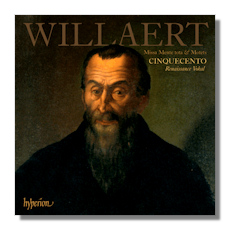
The Internet's Premier Classical Music Source
Related Links
-
Josquin Reviews
Willaert Reviews - Latest Reviews
- More Reviews
-
By Composer
-
Collections
DVD & Blu-ray
Books
Concert Reviews
Articles/Interviews
Software
Audio
Search Amazon
Recommended Links
Site News
 CD Review
CD Review
Adrian Willaert

Missa, "Mente tota"
- Adrian Willaert:
- Mass "Missa Mente tota"
- Motet "Laus tibi, sacra rubens"
- Motet "Creator omnium, Deus"
- Motet "O iubar, nostrae specimen salutis"
- Motet "Verbum bonum et suave"
- Motet "Quid non ebrietas?"
- Josquin Des Préz: Mente tota
- Cipriano de Rore: Concordes adhibete animos
Cinquecento
Hyperion CDA67749
This is a glorious CD of glorious music, gloriously sung! Adrian Willaert (c1490-1562) is another of those Renaissance composers – chiefly a composer of choral polyphony – whose output is truly top flight. Yet who is too little known. A contemporary of Josquin (whose mente tota, on which the longer mass is based, is performed first on this CD), Willaert was probably born in Bruges. He went to Rome when about 25, was appointed briefly to the Este court at Ferrara and thence to Venice, where he was maestro di cappella at San Marco for the last 35 years of his life.
His wrote music in almost every variety of form. Indeed, according to the musical "historian", Gioseffo Zarlino, writing later in the 16th century, Willaert was the inventor of the antiphonal style from which the polychoral style of the Venetian school evolved. Willaert can be credited with the evolution of the canzone and of chromaticism in madrigals. That's particularly evident in Quid non ebrietas? [tr.11] here. Willaert's style is invariably melodic, balanced, restrained, pure and infinitely beautiful.
These are some of the aspects of Willaert's writing which the all-male six-strong Cinquecento group bring to the fore… but quietly and with an impressive deftness. At times their delivery is so natural that it seems as though they might have been born singing such repertoire! At the same time their interpretations are full of zest and forward movement. Such a balance is evident especially in the beautiful and serene mass, Mente tota which occupies the central position on this CD. Such a balance only serves to make the music more accessible and make us more in awe of Willaert's command of the text and melodies, tonalities and textures with which he sets it. Indeed, Cinquecento's articulation is airy and lifts the music, privileging its etherial qualities. At the same time, the singers' consistent and constant tempi re-inforce our sense of the gravity and commitment with which Willaert must have approached his compositions.
These works do show the influence of Josquin, with whose music Willaert was of course familiar: long, even-flowing lines; melodies apparently simple in their beauty, but meticulously constructed; harmonies that are little less than angelic. But Cinquecento sing with an awareness of the perhaps slightly greater spareness which characterizes Willaert. Every syllable of their singing, by the way, is audible and carefully afforded due meaning. One does not hear, but one does detect, their supreme confidence: it's borne of both familiarity with and respect for – not to mention a real delight in – this gorgeous music.
Also on the CD are five motets by Willaert, O iubar, nostrae specimen salutis lasting 11½ minutes, and being the most striking. The differences between these pieces, the variety of inventiveness, is also striking. When Willaert died, in such great esteem was he held that he received many tributes. One of these was by Cipriano de Rore; his Concordes is included here too.
The acoustic, the Wallfahrtskirche in St. Wolfgang bei Weitra in Austria (Cinqecento is, after all, a group which draws its six members from five countries), is subdued and clean; it enhances the music by virtue of its clarity. In the booklet that comes with the CD, which is well up to Hyperion's usual high standards of production, is a useful background essay and the full texts in Latin with English and German translations. The Mass, four of the motets and the Concordes are here available on CD for the first time. Even were they not, it's hard to see how another group could achieve the degree of idiomatic and insightful interpretative success as have Cinquecento here. Thoroughly recommended both for those already familiar with Willaert's amazing work and those new to the repertoire.
Copyright © 2010, Mark Sealey.





















